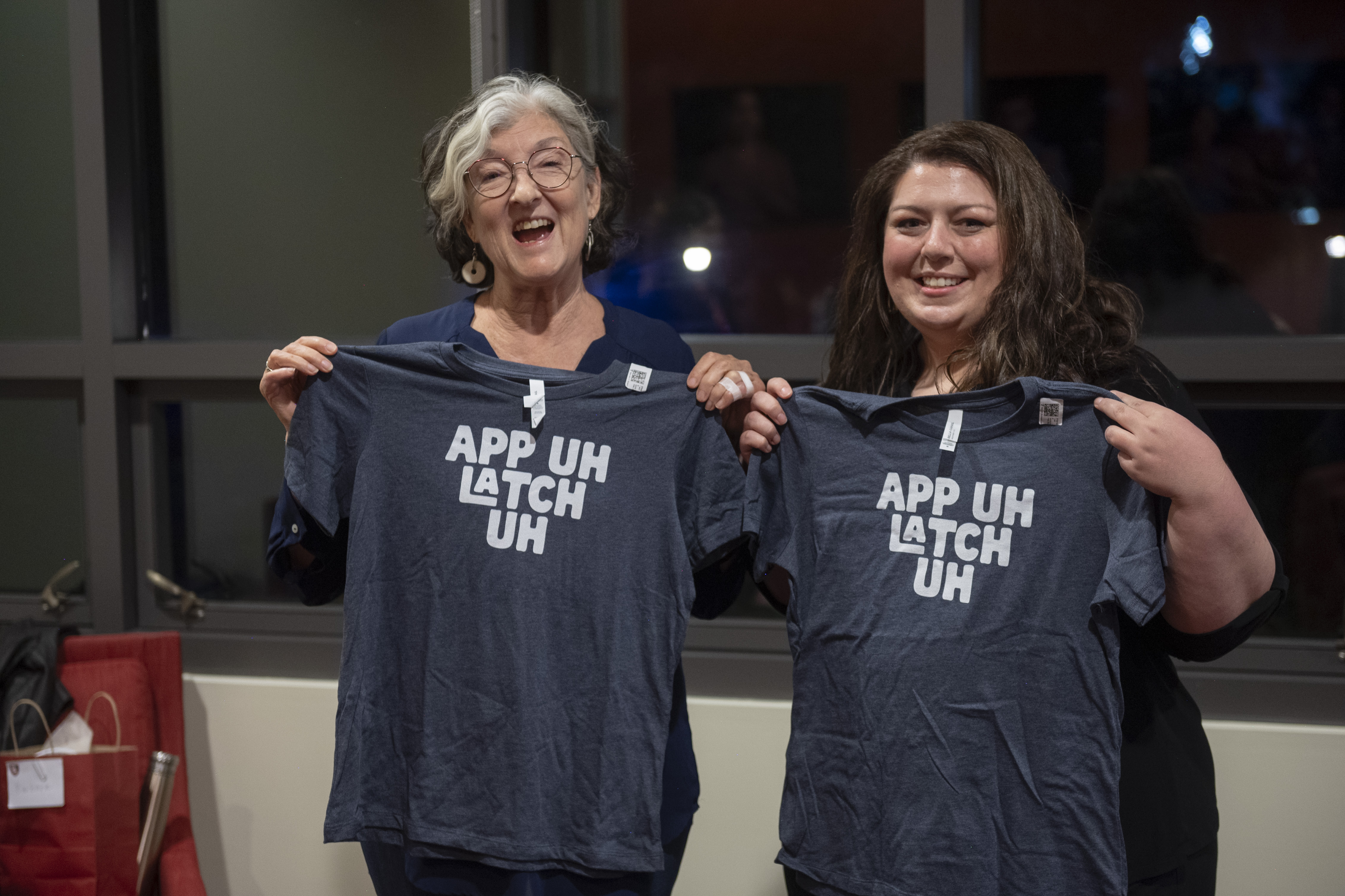
Kingsolver (left) and GSE PhD student Kelly Boles (right) hold up t-shirts spelling out the pronunciation of their home region. Appalachia has two different pronunciations across the United States. (Photo: Rod Searcey)
Barbara Kingsolver, acclaimed author and winner of a 2023 Pulitzer Prize for her most recent novel, Demon Copperhead, says that she waited many years – because of shame – to share the story of her Appalachian community.
“I’ve watched over time that progressive people have become much more prepared to consider structural and institutional poverty and oppression with respect to race, but not with respect to class,” Kingsolver said to a crowd of 400 at Stanford’s CEMEX Auditorium on Oct. 14.
“We still imagine that the Appalachian people who were left behind economically are there because we are lazy and stupid,” she said. “It wasn’t until I finally got old enough and solid enough that I decided I was going to try and tell this story of my people, to try and cross the divide.”
During her visit to campus, hosted by Stanford Graduate School of Education (GSE), Kingsolver shared her reverence for the power of literature and its potential for shaping people’s feelings about an oft-overlooked or disparaged part of society.
Kingsolver grew up in Central Appalachia, where Demon Copperhead, a modern retelling of Charles Dickens’ David Copperfield, is set. The novel tells the story of an orphaned boy’s journey of resilience through foster care, poverty, and addiction in rural Appalachia.
“Something literature can do that’s so special, that nothing else can do, is put you inside another person’s life,” Kingsolver said. “We learn from human experience, and literature is so sneaky because it can cross these divides that other forms of media often cannot.”
The power of visibility
The event was initiated by Kelly Boles, a GSE doctoral candidate who reached out to Kingsolver just eight weeks ago in the hopes that the author would be able to squeeze in an extra stop on her Pacific Coast book tour.
Boles, who also grew up in Central Appalachia, enrolled at the GSE after teaching science, technology, engineering, and mathematics (STEM) in Kentucky’s fifth district, one of the poorest congressional districts in the country, where she saw firsthand how rural students were affected by poverty and invisibility.
“A lot of people were surprised by some of the things in [Kingsolver’s] book, because of how harsh some of Demon’s experiences were,” Boles said, referring to the novel’s protagonist. “But I taught students who were like Demon. So his story felt very honest to me as an accurate portrayal of real challenges for people in Appalachia, and a true effort to highlight the systemic issues of the region.”
Boles is a fellow with the Diversifying Academia, Recruiting Excellence (DARE) program at Stanford, which supports doctoral students in preparing for academic careers and encourages fellows to develop projects that enhance students’ experience on campus. As part of the visit, Kingsolver also met with a group of about 10 GSE doctoral students, undergraduates studying creative writing, and students from the Stanford Storytelling Project to talk about the craft of writing and telling authentic stories.
The discussion at CEMEX that followed was moderated by Sarah Levine, an assistant professor at the GSE, and Lisa Goldman Rosas, an assistant professor at Stanford School of Medicine.

Kingsolver (left) and GSE PhD student Kelly Boles (right) hold up t-shirts spelling out the pronunciation of their home region. Appalachia has two different pronunciations across the United States. (Photo: Rod Searcey)
The importance of teachers
At the public event, Kingsolver emphasized that teachers played a prominent role in the book by introducing new ideas to students who’d only known one way, and encouraging the book’s main character, Demon, to cultivate his art.
“I think modeling reading for young children is very important, and what teachers do in the classroom is wonderful,” she said in response to an audience member, a high school English teacher who asked for pearls of wisdom regarding sparking a love for reading in students.
“English teachers are saints of the earth,” Kingsolver said. “You launch all of the future readers.”
“All of us here tonight were impacted by teachers in meaningful ways,” said Janet Carlson, faculty director of the GSE’s Center to Support Excellence in Teaching, who shared closing remarks at the event. “We want to make sure excellent teaching reaches everyone, not just those in places of privilege.”
Building bridges of compassion
Kingsolver said she likes to think of Demon Copperhead as her attempt at the Great Appalachian Novel: a history of how it became one of the poorest parts of the country, and the resilient, resourceful community of people who live there, through a story of a child.
“I wanted to write it for us, for my people, so we could see ourselves,” she said. “And I also wanted to write it for everybody else, so they could have a more nuanced view of who we are.”
Kingsolver said she first heard of Stanford when she was in her 20s, and by that time she’d learned to think she “had no business” in such places, assuming she’d be scorned for her accent and origins. Instead, she said, she found community – something she hopes will grow in place of stereotypes about people from where she grew up.
This event was co-sponsored by the Center to Support Excellence in Teaching, the DARE Doctoral Fellowship Program, the Stanford Haas Center for Public Service, and the Stanford Storytelling Project.